医学英语口语
- 格式:doc
- 大小:70.50 KB
- 文档页数:10
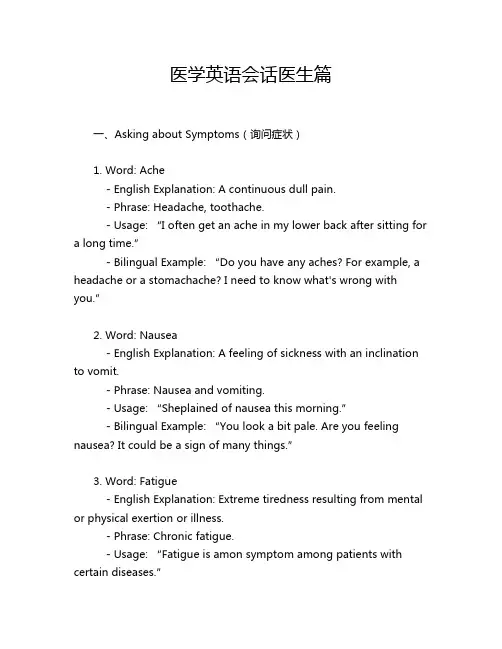
医学英语会话医生篇一、Asking about Symptoms(询问症状)1. Word: Ache- English Explanation: A continuous dull pain.- Phrase: Headache, toothache.- Usage: “I often get an ache in my lower back after sitting for a long time.”- Bilingual Example: “Do yo u have any aches? For example, a headache or a stomachache? I need to know what's wrong with you.”2. Word: Nausea- English Explanation: A feeling of sickness with an inclination to vomit.- Phrase: Nausea and vomiting.- Usage: “Sheplained of nausea this morning.”- Bilingual Example: “You look a bit pale. Are you feeling nausea? It could be a sign of many things.”3. Word: Fatigue- English Explanation: Extreme tiredness resulting from mental or physical exertion or illness.- Phrase: Chronic fatigue.- Usage: “Fatigue is amon symptom among patients with certain diseases.”- Bilingual Example: “You seem so tired all the time. Is it just normal fatigue or something more serious? I'm worried about you.”4. Word: Dizziness- English Explanation: A feeling of faintness, unsteadiness, and wooziness.- Phrase: Sudden dizziness.- Usage: “He experienced dizziness when he stood up too quickly.”- Bilingual Example: “Hey, you said you felt funny. Was it dizziness? That can be really concerning.”5. Word: Rash- English Explanation: An area of reddened, inflamed skin.- Phrase: Skin rash.- Usage: “A rash on the body can be caused by various factors.”- Bilingual Example: “I noticed you have a rash o n your arm. What do you think might have caused it? It's important we figure this out.”二、Diagnosing(诊断)6. Word: Diagnosis- English Explanation: The identification of the nature of an illness or other problem by examination of the symptoms.- Phrase: Accurate diagnosis.- Usage: “The doctor's diagnosis was based on a series of tests.”- Bilingual Example: “I've done all these tests, and my diagnosis is that you might have a mild infection. It's not too bad, but we need to treat it.”7. Word: Symptom- English Explanation: A physical or mental feature which is regarded as indicating a condition of disease.- Phrase: Key symptoms.- Usage: “We need to look at all your symptoms to make a proper diagnosis.”- Bilingual Example: “These symptoms you have are like pieces of a puzzle. We have to put them together to figure out what's wrong. Do you understand?”8. Word: Disorder- English Explanation: An illness that disrupts normal physical or mental functions.- Phrase: Mental disorder.- Usage: “There are many different types of disorders that can affec t a person.”- Bilingual Example: “I'm afraid you might be showing signs of a certain disorder. But don't worry, there are treatments available.”9. Word: Illness- English Explanation: A disease or period of sickness affecting the body or mind.- Phrase: Chronic illness.- Usage: “Living with a chronic illness can be very challenging.”- Bilingual Example: “Your symptoms suggest an illness. But we need more information. How long have you been feeling like this? It's crucial for me to k now.”10. Word: Disease- English Explanation: A disorder of structure or function in a human, animal, or plant, especially one that produces specific signsor symptoms or that affects a specific location and is not simply a direct result of physical injury.- Phrase: Infectious disease.- Usage: “Preventing infectious diseases is very important in public health.”- Bilingual Example: “I suspect you mig ht have a disease.Don't be scared. We'll do more tests to confirm it. Have you been arou nd anyone who was sick lately?”三、Treatment(治疗)11. Word: Treatment- English Explanation: The use of medical methods to try to cure an illness or injury.- Phrase: Medical treatment.- Usage: “The patient is receiving treatment for his heart condition.”- Bilingual Exam ple: “I think the best treatment for you right now is some rest and taking these medications. You'll be okay, trust me.”12. Word: Therapy- English Explanation: Treatment intended to relieve or heal a disorder.- Phrase: Physical therapy.- U sage: “After the accident, he needed physical therapy to regain his mobility.”- Bilingual Example: “We might need to consider therapy for your problem. It could be like a magic wand to make you feel better.”13. Word: Medication- English Explanation: A drug or other form of medicine that is used to treat or prevent illness.- Phrase: Prescription medication.- Usage: “Always follow the doctor's instructions when taking prescription medications.”- Bilingual Example: “I'm going to pres cribe some medication for you. Take it as directed. It's like little soldiers fighting the bad stuff in your body.”14. Word: Cure- English Explanation: A substance or treatment that can end a disease or medical condition.- Phrase: Potential cure.- Usage: “Scientists are constantly searching for a cure for cancer.”- Bilingual Example: “We hope this treatment will be a cure for your ailment. Wouldn't that be great? Just imagine being healthy again.”15. Word: Procedure- English Explanation: A medical operation or treatment.- Phrase: Surgical procedure.- Usage: “The surgical procedure was veryplex but successful.”- Bilingual Example: “We might have to consider a procedure to fix your problem. Are you okay with that? It's a big step, but it could solve everything.”四、Patient Care(病人护理)16. Word: Care- English Explanation: The provision of what is necessary for the health, welfare, maintenance, and protection of someone or something.- Phrase: Patient care.- Usage: “Good patient care is the key to a speedy recovery.”- Bilingual Example: “I want you to know that you'll get the best care here. We'll take care of you like you're family. How does that make you feel?”17. Word: Recovery- English Explanation: The process of bing well again after an illness or injury.- Phrase: Speedy recovery.- Usage: “The doctor wished the patient a speedy recovery.”- Bilingual Example: “Your recovery is our top priority. Do what I say, and you'll be on the road to recovery in no time. Don't you want that?”18. Word: Well - being- English Explanation: The state of beingfortable, healthy, or happy.- Phrase: Mental well - being.- Usage: “We should also focus on the patient's mental well - being during the treatment.”- Bilingual Example: “Your well - being matters to me. I'm not just here to fix your physical problems. How's your mental state? Are you feeling positive?”19. Word: Support- English Explanation: The act of giving assistance, especially financial or practical help.- Phrase: Emotional support.- Usage: “Patients often need emotional support during their illness.”- Bi lingual Example: “I'll give you all the support you need. Emotional support is just as important as medical treatment. You're not alone in this.”20. Word: Health- English Explanation: The state of being free from illness or injury.- Phrase: Public health.- Usage: “Public health initiatives are crucial for the well - being of themunity.”- Bilingual Example: “Your health is in your hands too. I can help, but you need to take care of yourself. Do you understand how important your health i s?”。
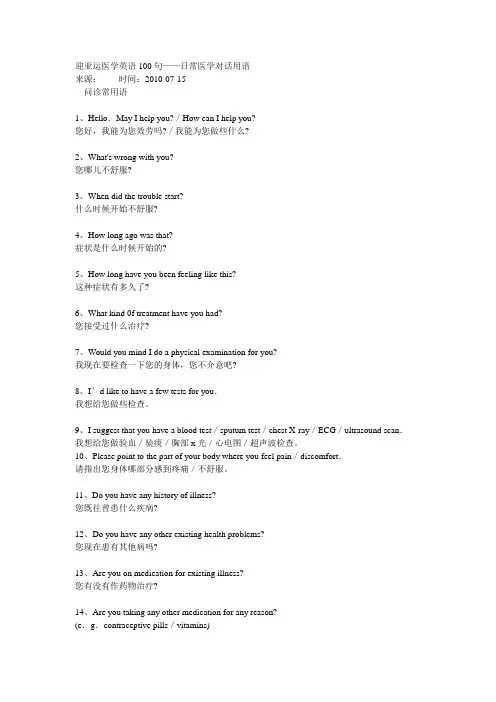
迎亚运医学英语100句——日常医学对话用语来源:时间:2010-07-15问诊常用语1、Hello.May I help you?/How can I help you?您好,我能为您效劳吗?/我能为您做些什么?2、What's wrong with you?您哪儿不舒服?3、When did the trouble start?什么时候开始不舒服?4、How long ago was that?症状是什么时候开始的?5、How long have you been feeling like this?这种症状有多久了?6、What kind 0f treatment have you had?您接受过什么治疗?7、Would you mind I do a physical examination for you?我现在要检查一下您的身体,您不介意吧?8、I’d like to have a few tests for you.我想给您做些检查。
9、I suggest that you have a blood test/sputum test/chest X-ray/ECG/ultrasound scan.我想给您做验血/验痰/胸部x光/心电图/超声波检查。
10、Please point to the part of your body where you feel pain/discomfort.请指出您身体哪部分感到疼痛/不舒服。
11、Do you have any history of illness?您既往曾患什么疾病?12、Do you have any other existing health problems?您现在患有其他病吗?13、Are you on medication for existing illness?您有没有作药物治疗?14、Are you taking any other medication for any reason?(e.g.contraceptive pills/vitamins)您还因为别的原因吃其他的药吗? (如避孕药、维生素之类)15、Have you had any bacterial or viral infection recently?您最近是否受过细菌或病毒感染?16、Have you had any medical tests recently?您最近做过什么检查?17、Do you smoke? How many cigarettes a day do smoke?您吸烟吗?每天抽多少?18、Do you drink alcohol? How much do you drink a day?您喝酒吗? 一天喝多少?19、Is there anything you need to tell me that you think will be helpful?您是否还有其他对病情有用的信息可以提供给我?20、I’m afraid you will have to be hospitalized for further treatment/investigation.您需要住院治疗/检查。
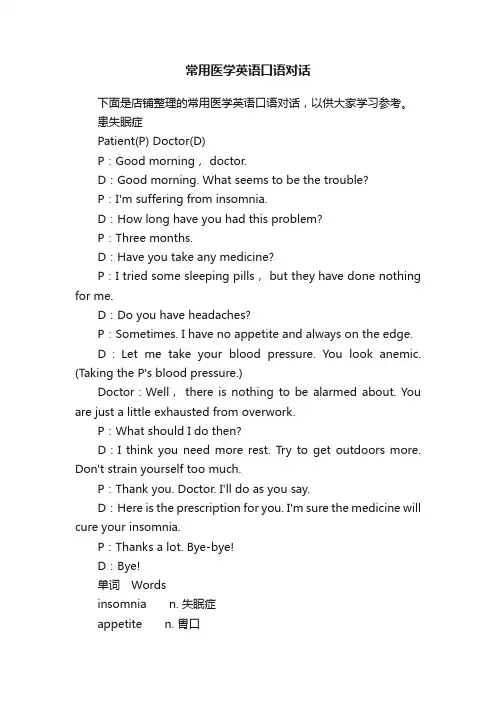
常用医学英语口语对话下面是店铺整理的常用医学英语口语对话,以供大家学习参考。
患失眠症Patient(P) Doctor(D)P:Good morning, doctor.D:Good morning. What seems to be the trouble?P:I'm suffering from insomnia.D:How long have you had this problem?P:Three months.D:Have you take any medicine?P:I tried some sleeping pills, but they have done nothing for me.D:Do you have headaches?P:Sometimes. I have no appetite and always on the edge.D:Let me take your blood pressure. You look anemic. (Taking the P's blood pressure.)Doctor:Well,there is nothing to be alarmed about. You are just a little exhausted from overwork.P:What should I do then?D:I think you need more rest. Try to get outdoors more. Don't strain yourself too much.P:Thank you. Doctor. I'll do as you say.D:Here is the prescription for you. I'm sure the medicine will cure your insomnia.P:Thanks a lot. Bye-bye!D:Bye!单词Wordsinsomnia n. 失眠症appetite n. 胃口pressure n. 压力,血压anemic n. 贫血病exhausted adj 疲倦,筋疲力尽overwork n. 过度劳累outdoors adv 户外cure n. vt 治愈,治好短语Phrasessuffer from 遭受sleeping pills 安眠药on the edge 紧张不安take sb's blood pressure 量血压句子Sentence PatternsWhat seems to be the trouble?哪里不舒服?How long have you had this problem?这种情况有多久了?I tried some sleeping pills, but they have done nothing for me.我试过安眠药,但是对我一点儿都不起作用。
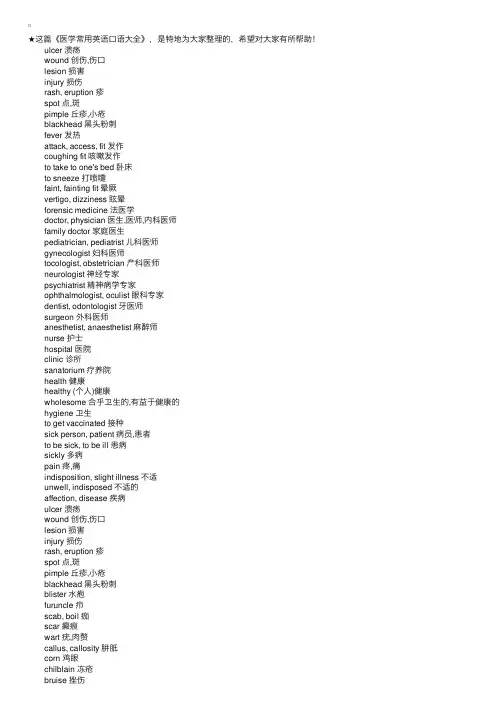
★这篇《医学常⽤英语⼝语⼤全》,是特地为⼤家整理的,希望对⼤家有所帮助! ulcer 溃疡 wound 创伤,伤⼝ lesion 损害 injury 损伤 rash, eruption 疹 spot 点,斑 pimple 丘疹,⼩疮 blackhead ⿊头粉刺 fever 发热 attack, access, fit 发作 coughing fit 咳嗽发作 to take to one's bed 卧床 to sneeze 打喷嚏 faint, fainting fit 晕厥 vertigo, dizziness 眩晕 forensic medicine 法医学 doctor, physician 医⽣,医师,内科医师 family doctor 家庭医⽣ pediatrician, pediatrist ⼉科医师 gynecologist 妇科医师 tocologist, obstetrician 产科医师 neurologist 神经专家 psychiatrist 精神病学专家 ophthalmologist, oculist 眼科专家 dentist, odontologist ⽛医师 surgeon 外科医师 anesthetist, anaesthetist ⿇醉师 nurse 护⼠ hospital 医院 clinic 诊所 sanatorium 疗养院 health 健康 healthy (个⼈)健康 wholesome 合乎卫⽣的,有益于健康的 hygiene 卫⽣ to get vaccinated 接种 sick person, patient 病员,患者 to be sick, to be ill 患病 sickly 多病 pain 疼,痛 indisposition, slight illness 不适 unwell, indisposed 不适的 affection, disease 疾病 ulcer 溃疡 wound 创伤,伤⼝ lesion 损害 injury 损伤 rash, eruption 疹 spot 点,斑 pimple 丘疹,⼩疮 blackhead ⿊头粉刺 blister ⽔疱 furuncle 疖 scab, boil 痂 scar 癜痕 wart 疣,⾁赘 callus, callosity 胼胝 corn 鸡眼 chilblain 冻疮 bruise 挫伤 ecchymosis 瘀癍 bump 肿 swelling 肿胀 contusion 挫伤 sprain, twist 扭伤 fracture ⾻折 symptom 症状 diagnosis 诊断 case 病例 incubation 潜伏 epidemic 流⾏病 contagion 传染 fever 发热 attack, access, fit 发作 coughing fit 咳嗽发作 to take to one's bed 卧床 to sneeze 打喷嚏 faint, fainting fit 晕厥 vertigo, dizziness 眩晕。
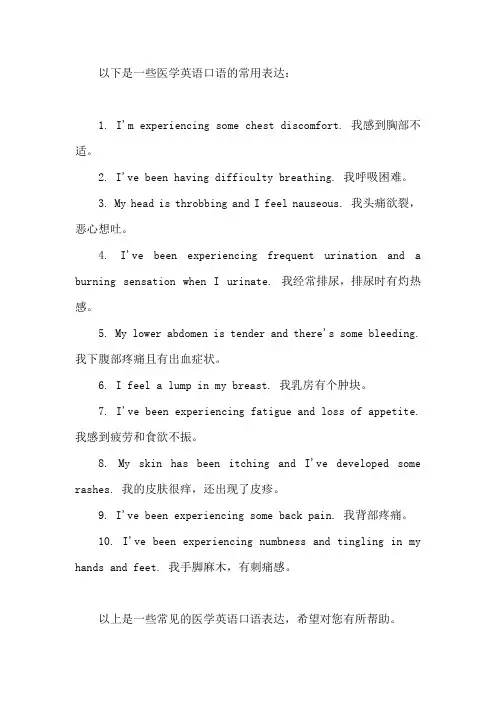
以下是一些医学英语口语的常用表达:
1. I'm experiencing some chest discomfort. 我感到胸部不适。
2. I've been having difficulty breathing. 我呼吸困难。
3. My head is throbbing and I feel nauseous. 我头痛欲裂,恶心想吐。
4. I've been experiencing frequent urination and a burning sensation when I urinate. 我经常排尿,排尿时有灼热感。
5. My lower abdomen is tender and there's some bleeding. 我下腹部疼痛且有出血症状。
6. I feel a lump in my breast. 我乳房有个肿块。
7. I've been experiencing fatigue and loss of appetite. 我感到疲劳和食欲不振。
8. My skin has been itching and I've developed some rashes. 我的皮肤很痒,还出现了皮疹。
9. I've been experiencing some back pain. 我背部疼痛。
10. I've been experiencing numbness and tingling in my hands and feet. 我手脚麻木,有刺痛感。
以上是一些常见的医学英语口语表达,希望对您有所帮助。
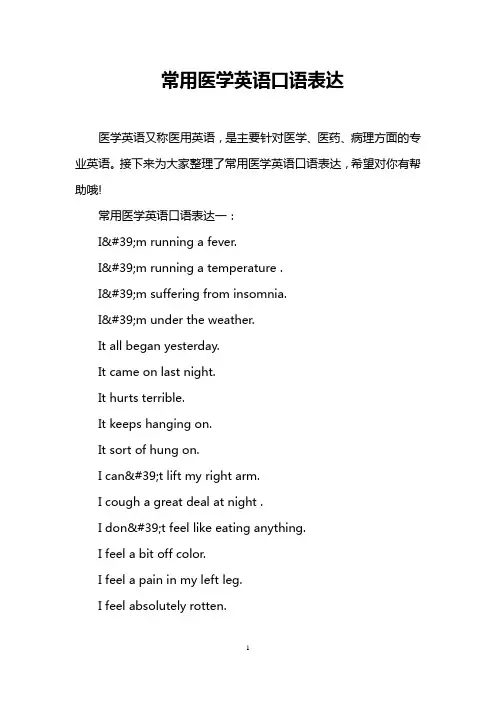
常用医学英语口语表达医学英语又称医用英语,是主要针对医学、医药、病理方面的专业英语。
接下来为大家整理了常用医学英语口语表达,希望对你有帮助哦!常用医学英语口语表达一:I'm running a fever.I'm running a temperature .I'm suffering from insomnia.I'm under the weather.It all began yesterday.It came on last night.It hurts terrible.It keeps hanging on.It sort of hung on.I can't lift my right arm.I cough a great deal at night .I don't feel like eating anything.I feel a bit off color.I feel a pain in my left leg.I feel absolutely rotten.I feel chilly.I feel dizzy and I've got no appetite.I feel feverish.I feel hot and cold.I feel like I'm burning up.常用医学英语口语表达二:I feel like vomiting.I feel poorly.I feel rather unwell.I feel shivery and I've got a sore throat.I feel sick.I feel so ill.I feel very bad.I feel a dull pain in the stomach.I have a headache.I have a splitting headache.I have a stomach-ache.I have a stuffed-up nose.I just feel all pooped out.I keep feeling dizzy.I really feel terrible.I seem to have pain all over.I think I'm dying.I tried some sleeping pills,but they have done nothing for me.I'm a bit stuffed up.I'm aching all over.I'm afraid I've got a temperature.I'm feeling rather out of sorts these days .I'm having some trouble sleeping.I'm rather sick.。
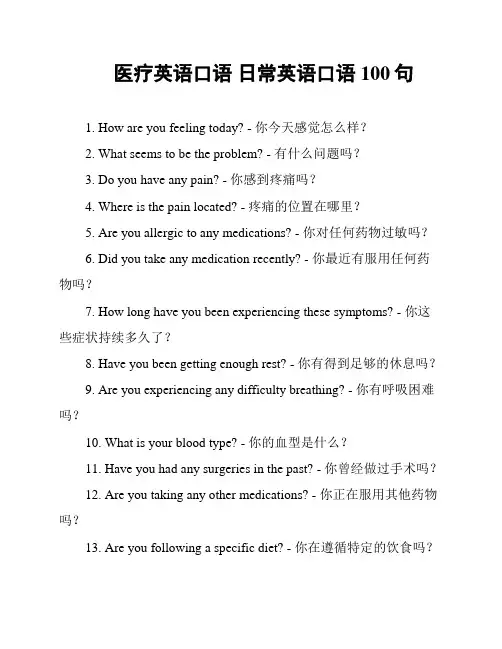
医疗英语口语日常英语口语100句1. How are you feeling today? - 你今天感觉怎么样?2. What seems to be the problem? - 有什么问题吗?3. Do you have any pain? - 你感到疼痛吗?4. Where is the pain located? - 疼痛的位置在哪里?5. Are you allergic to any medications? - 你对任何药物过敏吗?6. Did you take any medication recently? - 你最近有服用任何药物吗?7. How long have you been experiencing these symptoms? - 你这些症状持续多久了?8. Have you been getting enough rest? - 你有得到足够的休息吗?9. Are you experiencing any difficulty breathing? - 你有呼吸困难吗?10. What is your blood type? - 你的血型是什么?11. Have you had any surgeries in the past? - 你曾经做过手术吗?12. Are you taking any other medications? - 你正在服用其他药物吗?13. Are you following a specific diet? - 你在遵循特定的饮食吗?14. Have you been feeling dizzy or lightheaded? - 你感到头晕或头昏吗?15. Can you describe your symptoms in detail? - 你能详细描述你的症状吗?16. Do you have a family history of any medical conditions? - 你的家族中有任何医学状况吗?17. Are you sexually active? - 你有性生活吗?18. Have you been tested for any sexually transmitted infections? - 你曾经接受过任何性传播感染的测试吗?19. When was your last menstrual period? - 你上次月经是什么时候?20. How often do you exercise? - 你多久锻炼一次?21. Are you experiencing any changes in your appetite? - 你的食欲有任何变化吗?22. Are you experiencing any changes in your weight? - 你的体重有任何变化吗?23. Are you experiencing any changes in your sleep patterns? - 你的睡眠模式有任何变化吗?24. Are you experiencing any changes in your vision? - 你的视力有任何变化吗?25. Have you been feeling depressed or anxious? - 你感到抑郁或焦虑吗?26. Do you smoke or drink alcohol? - 你抽烟或喝酒吗?27. Are you currently taking any supplements or herbal remedies? - 你目前正在服用任何补品或草药吗?28. How often do you consume caffeine? - 你多久摄入一次咖啡因?29. Have you been experiencing any urinary problems? - 你有任何尿液方面的问题吗?30. Are you experiencing any changes in your bowel movements? - 你的排便有任何变化吗?31. Are you sexually active and not using contraception? - 你正在有性生活并且不使用避孕措施吗?32. Do you have any history of sexually transmitted infections? - 你有任何性传播感染的病史吗?33. Have you recently traveled to any foreign countries? - 最近你有去过其他国家吗?34. Have you been in contact with anyone who has been sick? - 你与任何生病的人接触过吗?35. Do you live or work in an environment with potential health hazards? - 你生活或工作的环境可能有健康隐患吗?36. Have you been exposed to any chemicals or toxins? - 你接触到任何化学物质或毒素吗?37. Do you have any known allergies? - 你有任何已知的过敏吗?38. Have you had any recent X-rays or other medical imaging? - 你最近有过X光或其他医学影像吗?39. Are you experiencing any chest pains or tightness? - 你有胸痛或紧迫感吗?40. Are you experiencing any difficulty swallowing? - 你有吞咽困难吗?41. Have you had any recent injuries or accidents? - 你最近有过任何伤害或事故吗?42. Have you experienced any loss of consciousness or seizures? - 你有过任何失去意识或痉挛的经历吗?43. Are you experiencing any changes in your hearing? - 你的听力有任何变化吗?44. Are you experiencing any changes in your sense of taste or smell? - 你的味觉或嗅觉有任何变化吗?45. Have you had any recent blood tests? - 你最近有过任何血液测试吗?46. Are you currently pregnant or trying to conceive? - 你目前怀孕或试图怀孕吗?47. Are you experiencing any changes in your menstrual cycle? - 你的月经周期有任何变化吗?48. When was your last pap smear or gynecological examination? - 你最近进行了宫颈抹片或妇科检查吗?49. Do you have any concerns about your sexual health? - 你对你的性健康有任何担忧吗?50. Are you experiencing any changes in your mood or emotions? - 你的情绪或情感有任何变化吗?51. Do you have a history of mental health disorders? - 你有心理健康障碍的病史吗?52. Have you been experiencing any memory problems? - 你有任何记忆问题吗?53. Are you experiencing any changes in your coordination or balance? - 你的协调或平衡有任何变化吗?54. Have you had any recent falls or accidents? - 你最近有过任何跌倒或事故吗?55. Are you experiencing any numbness or tingling sensations? - 你有任何麻木或刺痛感吗?56. Do you have any family history of neurological disorders? - 你有任何神经系统疾病的家族史吗?57. Are you experiencing any difficulty with speaking or understanding language? - 你有语言表达或理解上的困难吗?58. Have you had any recent head injuries? - 你最近有过任何头部受伤吗?59. Do you have any dental concerns? - 你有任何牙齿方面的顾虑吗?60. Are you experiencing any changes in your oral health? - 你的口腔健康有任何变化吗?61. Have you had any recent dental procedures? - 你最近做过任何牙科手术吗?62. How often do you brush and floss your teeth? - 你多久刷牙和用牙线?63. Do you wear any dental appliances like braces or dentures? - 你戴着任何牙科器械,如牙套或假牙吗?64. Have you been experiencing any skin problems? - 你有任何皮肤问题吗?65. Are you experiencing any changes in your skin, such as rashesor discoloration? - 你的皮肤有任何变化,如皮疹或色素沉着吗?66. Have you had any recent skin biopsies or dermatological procedures? - 你最近有进行过任何皮肤活检或皮肤科手术吗?67. Are you currently using any skincare products or medicationsfor your skin? - 你目前使用任何护肤品或药物来护理你的皮肤吗?68. Have you had any recent eye exams? - 你最近有进行过任何眼科检查吗?69. Are you experiencing any changes in your vision, such as blurriness or double vision? - 你的视力有任何变化,如模糊或重影吗?70. Do you wear corrective lenses or contact lenses? - 你戴矫正眼镜或隐形眼镜吗?71. Have you had any recent eye surgeries or procedures? - 你最近有进行过任何眼科手术或程序吗?72. Are you currently using any eye drops or medications for your eyes? - 你目前使用任何眼药水或眼科药物吗?73. Do you have any family history of eye conditions or diseases? - 你有任何眼科疾病的家族史吗?74. Are you experiencing any changes in your hearing? - 你的听力有任何变化吗?75. Have you had any recent hearing tests or audiograms? - 你最近有进行过任何听力测试或听力图表测定吗?76. Do you wear any hearing aids? - 你戴助听器吗?77. Are you currently using any ear drops or medications for your ears? - 你目前使用任何滴耳液或耳科药物吗?78. Have you had any recent ear surgeries or procedures? - 你最近有进行过任何耳科手术或程序吗?79. Are you experiencing any changes in your balance or dizziness? - 你的平衡或头晕有任何变化吗?80. Have you had any recent audiology evaluations or vestibular tests? - 你最近有进行过任何听力学评估或前庭测试吗?81. Do you wear any orthopedic devices or braces? - 你戴任何矫形设备或支架吗?82. Have you had any recent fractures or injuries to your bones or joints? - 你最近有过任何骨折或关节损伤吗?83. Are you experiencing any difficulty with movement or joint pain? - 你的运动或关节有任何困难或疼痛吗?84. Have you had any recent physical therapy sessions? - 你最近有进行过任何物理治疗吗?85. Are you currently taking any medications for pain or inflammation? - 你目前服用任何止痛或消炎药物吗?86. Do you have any family history of orthopedic conditions or diseases? - 你有任何骨科疾病的家族史吗?87. Are you experiencing any changes in your gastrointestinal system? - 你的消化系统有任何变化吗?88. Have you had any recent abdominal surgeries or procedures? - 你最近进行过任何腹部手术或程序吗?89. Are you experiencing any changes in your bowel habits or bowel movements? - 你的排便惯或排便有任何变化吗?90. Are you currently taking any medications for gastrointestinal issues? - 你目前正在服用任何消化系统问题的药物吗?91. Have you had any recent endoscopies or colonoscopies? - 你最近进行过任何内窥镜检查或结肠镜检查吗?92. Do you have any family history of gastrointestinal conditions or diseases? - 你有任何消化系统疾病的家族史吗?93. Are you experiencing any changes in your urinary system? - 你的泌尿系统有任何变化吗?94. Have you had any recent urinary tract infections or kidney stones? - 你最近有进行过任何尿路感染或肾结石的治疗吗?95. Are you experiencing any changes in your urinary frequency or urgency? - 你的排尿频率或紧迫感有任何变化吗?96. Are you currently taking any medications for urinary issues? - 你目前正在服用任何泌尿系统问题的药物吗?97. Have you had any recent kidney function tests or bladder scans? - 你最近有进行过任何肾功能测试或膀胱扫描吗?98. Do you have any family history of urinary conditions or diseases? - 你有任何泌尿系统疾病的家族史吗?99. Are you experiencing any changes in your reproductive system? - 你的生殖系统有任何变化吗?100. Have you had any recent screenings or exams for reproductive health? - 你最近有进行过任何生殖健康方面的筛查或检查吗?以上是一些日常医疗英语口语的例句,希望对您有帮助!。
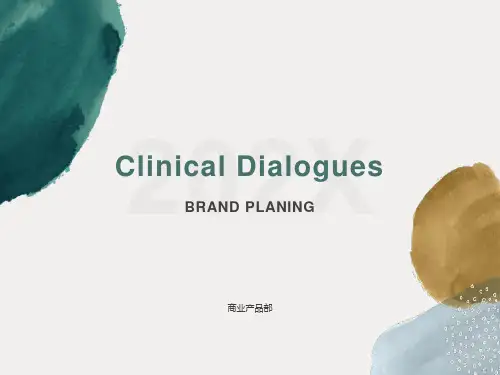

学医英语口语1. Good morning, how can I help you today? - 早上好,我今天能帮你什么吗?2. Could you please describe your symptoms? - 你能描述一下你的症状吗?3. When did your symptoms start? - 你的症状什么时候开始的?4. Have you tried any home remedies for your condition? - 你有尝试过家庭疗法治疗吗?5. Are you currently taking any medication? - 你正在服用药物吗?6. Have you had any previous medical conditions or surgeries? - 你之前有过什么病症或手术吗?7. How would you rate your pain on a scale of 1 to 10? - 你能把你的疼痛程度在1到10之间打几分?8. Have you noticed any patterns or triggers for your symptoms? -你有没有注意到任何疗效或诱发你症状的因素?9. Are there any allergies we should be aware of? - 有没有任何过敏反应我们需要知道的?10. Let's schedule some tests to further assess your condition. - 让我们安排一些测试来进一步评估您的状况。
11. Based on your symptoms, it appears you may have [condition]. - 根据您的症状看起来你可能有[病症]。
12. I'm going to prescribe some medication for you to take. - 我将给你开一些药物。
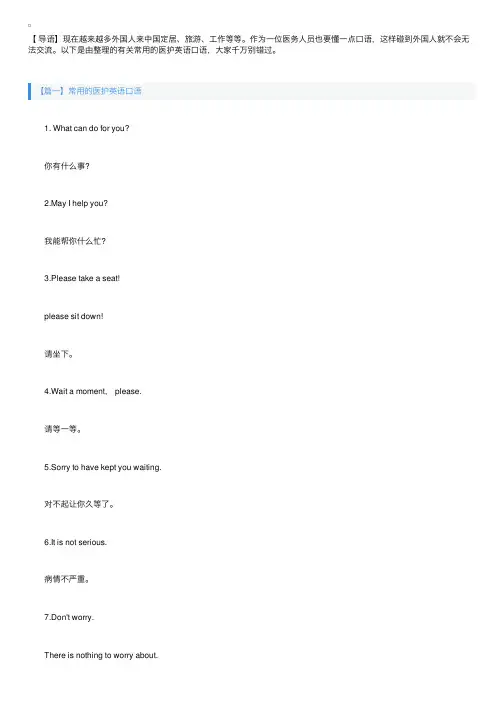
【导语】现在越来越多外国⼈来中国定居、旅游、⼯作等等。
作为⼀位医务⼈员也要懂⼀点⼝语,这样碰到外国⼈就不会⽆法交流。
以下是由整理的有关常⽤的医护英语⼝语,⼤家千万别错过。
【篇⼀】常⽤的医护英语⼝语 1. What can do for you? 你有什么事? 2.May I help you? 我能帮你什么忙? 3.Please take a seat! please sit down! 请坐下。
4.Wait a moment, please. 请等⼀等。
5.Sorry to have kept you waiting. 对不起让你久等了。
6.It is not serious. 病情不严重。
7.Don't worry. There is nothing to worry about. 不必顾虑。
8.You need a thorough examination. 你需要做⼀个全⾯检查。
9.You will have to stay in hospital for sevral days. 你需要在医院⾥住⼏夭。
We think that you had better be hospitalized 我们认为你住进医院来。
10. You should stay in bed for a few days. 你需要卧床⼏天。
11. You can keep on working. You can carry on with your work. 可以继续⼯作。
12. You should be very careful for a week or two 这⼀两周内,你需要很注意。
13. Try to relax and keep calm. 尽量放松保持镇静。
14. You'll soon be all right. 你很快就会好起来的。
15. 1'm sure this medicine will help you a great deal. 这药对你肯定会很有效的。
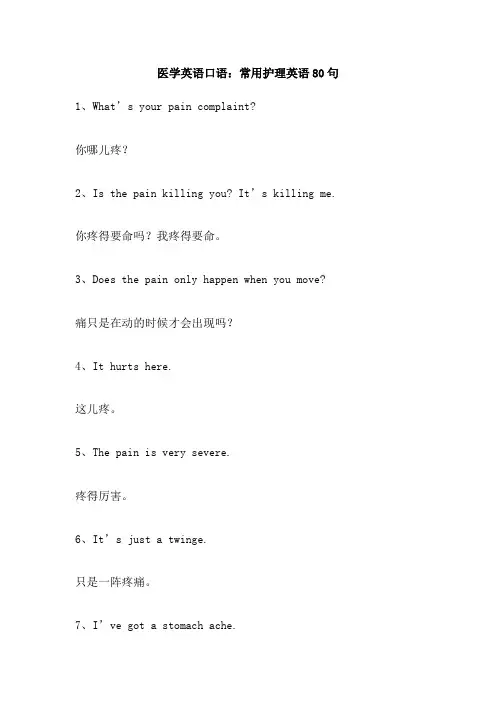
医学英语口语:常用护理英语80句1、What’s your pain complaint?你哪儿疼?2、Is the pain killing you? It’s killing me. 你疼得要命吗?我疼得要命。
3、Does the pain only happen when you move? 痛只是在动的时候才会出现吗?4、It hurts here.这儿疼。
5、The pain is very severe.疼得厉害。
6、It’s just a twinge.只是一阵疼痛。
7、I’ve got a stomach ache.我肚子疼。
8、I can’t stop coughing.我咳嗽不止。
9、My face is burning.我的脸发烫。
10、That’s a sharp pain.疼得厉害。
医生常用英语口语1、What seems to be the problem?2、How long have you had this problem?3、Have you ever had this problem before?4、Does the pain come and go or is it constant?5、Does the pain radiate anywhere?6、What seems to bring the pain on?7、What do you feel in your chest?8、Do you have any shortness of breath?9、Do you have any numbness or tingling?10、Does the pain go down your arm?11、Are you having any discharge from your ears?12、Do you have any dizziness?13、Are you having any hearing problems?14、Have you had any recent upper respiratory infections?15、Do you have any recent change in your vision?英语口语考试常用对话1、问候用语Good morning/afternoon/evening.早上/下午/晚上好。
常用医学英语口语对话医学不论是哪种语言都是很深奥的东西,不知道关于它的英语口语对话都有哪些呢?下面是店铺给大家带来常用医学英语口语对话,供大家参阅!常用医学英语口语对话1D: Good morning, what seems to be the problem today, Mr. Chen?P: Well, I've had nocturia for six months and I started losing weight four months ago.D: Any other problems? Have you noticed any changes in your urine?P: Yes, it's darker, reddish. I wonder if it could be blood.D: Have you noticed anything else?P: Yes. I've felt sick several times in the morning and I've noticed my legs are swollen after work in the evening. Also, I've felt really groggy for some weeks now. I don't seem to enjoy my food any more and I've lost weight.D: How much?P: About 6Kg.D: How long have you had this trouble?P: About 4 months really.D: Have you ever had trouble with your urine before?P: Yes. Two years ago I had a burning sensation when I passed water. The doctor said that I had high blood pressure as well and he put me on tablets and it cleared up.D: Well, I'd like to examine you. Please come to the examination room, remove your clothes except your underpants, and lie on the table.(After examination)D: You can get dressed now ... well, it looks like you have some reduced kidney function. I want you to take some blood tests, X-rays and kidney function tests. I'd like you to collect your urine for 24 hours. The nurse will tell you exactly how to do it.Then we'll ask you to come in for an ultrasound examination of the kidneys. This is a very simple procedure to make sure there is no obstruction.P: Can you tell me exactly what is wrong with my kidneys?D: Well, the tests show that you are in a condition called chronic glomerulonephritis, which has damaged the kidneys.P: Is the chronic glomerulonephritis severe? Are there any good treatments to repair the kidney damage?D: Yes, of course. You'd better stay in the hospital for treatments, and observation. We'll have to insert a tube into your abdomen to flash out toxic substances in the blood stream.P: How long will I have to stay in hospital? Will I have to stop working?D: For about 3-4 weeks. Just remind me. What's your job?P: I'm a teacher.D: Well, I should advise you to have a 2-month rest.P: Thank you doctor.D: Not at all.参考译文医生:早上好,陈先生,你哪里不舒服?病人:我夜尿多(遗尿)六个月了,而且我四个月前体重开始下降。
医学人员常用英语口语1.医学人员常用英语口语篇一1、Please take off your shoes and lie down.请脱鞋,躺下。
2、May I help you?我能帮你什么忙?3、Please take a seat!请坐。
4、Wait a moment, please.请等一等。
5、Sorry to have kept you waiting.对不起让你久等了。
6、It is not serious.病情不严重。
7、Don't worry.不必顾虑。
8、You need a thorough examination.你需要做一个全面检查。
9、You will have to stay in hospital for sevral days.你需要在医院里住几夭。
10、You should stay in bed for a few days.你需要卧床几天。
2.医学人员常用英语口语篇二1、You can keep on working.可以继续工作。
2、You should be very careful for a week or two.这一两周内,你需要很注意。
3、Try to relax and keep calm.尽量放松保持镇静。
4、You'll soon be all right.你很快就会好起来的。
5、1'm sure this medicine will help you a great deal.这药对你肯定会很有效的。
6、Feeling well again is a rather slow process, I'm afraid.恐怕痊愈将是一个很慢的过程。
7、You will have to wait for twenty minutes.你需要等20分钟。
8、Complete recovery will take a rather long time.彻底恢复需要一段很长的时间。
一.Receiving the patient(接待病人)1.How do you do?/ Good morning!2.您好!(初次见面时使用)/早上好!3.What can I do for you?/Can I help you?4.您需要我帮助吗?3.I'll bring you to your bedside, please follow me. This is your bed……我要领您到床边去.请跟我来.这是您的床位.4.The toilet is over there.卫生间在那边5.We supply hot water.我们供应热水6.Please wait a moment. I'll let your doctor know. /I'll inform your doctor .请等一会儿,我去通知医生.7.Mary is the nurse /doctor in charge of you.玛丽是您的负责护士/医生8.Please let us know if you need any help.您需要帮助时,请告诉我们.9.Smoking is not allowed here.这里不允许吸烟二.information collection(收集信息)10.Do you mind if I ask you a few questions?您介意我问您几个问题吗?11.We need some information from you.我们需要从您这儿收集一些信息.12.Is your tummy still sore?您的肚子还疼吗?13.Does your pain come on after or before meals?您的疼痛是在饭前还是饭后发作?14.Does it hurt to pass urine?/when I press here?排尿时痛吗?/当我按压这儿时痛吗?15.Does your back ache?您的后背痛吗?16.Do your feet swell?您的脚肿了吗?17.Do you have a cough/fever?您咳嗽吗?/您有发热吗?18.Do you bring up any sputum?您咳痰吗?19.Is there any radiation of the pain ?(to the shoulder)有放射(到肩部的)痛吗?20.How long have you had the pain?您的痛有多长时间了?21.When did the pain start?/where is your pain?疼痛从什么时候开始的/什么地方疼痛?22.Are your periods regular?您的月经规则吗?三.Physical examination(查体)23.Will you please undress for medical examination?请您脱下衣服做体检好吗?24.Take off your clothes, please.请把衣服脱下来25.Lie down on the couch, please./Just lie still on the couch and relax.请躺在治疗床上./请安静地躺在治疗床上,放松.26.Bend your knees, please.请屈膝.27.Open your mouth and say 'ah“张开口,说:啊28.Beathe deeply, please./take a deep breath, please.请深呼吸29.May I examine your tummy, please?我要检查下您的肚子,好吗?30.Roll up your sleeves, please.请卷起袖子.四.communication.(交流)31.I am going to take your temperature./Please put the thermometer under your armpit .我要测一下您的体温/请把体温计放在您的腋下.32.Let me feel your pulse.让我测一下您的脉搏.33.I'll test/take your blood pressure.我要测量您的血压.34. I'm afraid I have to prick your finger and take a drop of blood for blood sugar level. 我要取一滴指血做血糖测定,需要刺一下手指.35.I'll take some blood from your arm now.现在我要从您的胳膊抽血.36.Don't take any thing by mouth after midnight until the blood is drawn tomorrow morning .半夜之后不要吃喝任何东西,明天早上抽血.37.Please bring a specimen of your urine/stool/sputum./ please collect your mid-stream specimen of urine.请留一份尿/便/痰的标本/请收集您的中段尿.38.Please have your blood and urine tests done.请做一下您的血和尿试验.39.You are going to have a CT-scan of your chest/head today.今天您要做一个胸部/头部CT.40.You are going to have a chest X-ray this morning.今天早上您要拍一个胸片.41.You are going to have a B-mode ultrasonic exam. Please keep your bladder full.您要做B超检查,请留尿,使膀胱充盈.42.You are going to have an gastric endoscopy tomorrow morning.please don't eat or drink anything after 12 o'clock tonight.明天上午您要做胃镜检查,今晚12点之后,请不要吃喝任何东西。
医学询问的常用英语口语1.医学询问的常用英语口语1. have you been to a doctor recently?你最近看过医生吗?2. have you had any operations in the past?你过去做过手术吗?3. are you allergic to anything?你对什么过敏吗?4. when was your last period?你最近一次例假是在什么时候?5. have you been drinking at all?你是不是一直嗜酒?6. do you smoke?你抽烟吗?7. have you lost any weight recently?你近来体重减轻了吗?8. have you had your heart tested this year?你今年检查过心脏吗?9. have you ever had diabetes?你患过糖尿病吗?10. did you have the history of dyspnea?你有过呼吸困难的病史吗?2.英语口语练习方法一、调整心态“玩”可以使学习充满了无限的乐趣,如果用“玩”的心态去做某件事,即使它是困难的也会觉得充满了无限的乐趣,让你更有兴趣的坚持学下去。
二、自主性学习阅读可以增加词汇量,也可以提高自己的口语表达和语言深度。
但阅读的前提是要有一定的单词作为基础,所以首先要谈论如何把背单词变成一件快乐的事情。
这个阶段已经有一定的英语基础,不需要死记硬背每个单词,应该独立学习新单词,其实有点像我们学习汉语,用一个单词造句,或者将单词灵活运用于日常生活中的话题。
这样不仅记得准还能记得牢,每当这个单词出现的时候,脑海中可能浮现的就是某种场景或跟朋友的一个经典桥段。
三、看电影有很多人看了很多英语大片,但是英语水平并没有很大的进步,然后开始怀疑自己学习英语的天赋。
其实刚开始就是这样。
大多数中国人总是喜欢看下面的中文字幕,这样不会提升学习效果的。
医学英语口语表达大全为了关心大家学好(医学英语),下面我给大家带来医学(英语口语)表达大全,盼望对大家有所关心!医学英语口语表达:胃肠胃肠Stomach Bowels(1)当空腹时,他感觉胃里不舒适。
He has a certain disagreeable felling in the stomach when it is empty.胃不调upset stomach消化不良have bad(impaired:defective)digestion;suffer from indigestion(dyspepsia)胃有毛病have a disordered stomach(stomach disorder);something is wrong with ones stomach.因过食而伤胃injure ones stomach by overeating oneself觉食物积滞胃中feel heavy on the stomach食物不易消化lie(sit)heavy on ones stomach自从那时起,消化便已失常。
Thereafter,the digestion was not really good.曾有过一时性的恶心和呕吐,但并没有食欲不振或体重削减发生。
Transient nausea and vomiting was present,but no anorexia or weight loss occurred.欲呕feel nauseated有晨吐have morning sickness夜吐(饭后恶心)nocturnal(postprandial)nausea晕船(车)be sea-(car-)sick有点恶心have(experience)some nausea严峻的作呕have considerable retching里急后重时发生恶心和呕吐have a spell of N V while straining at stool患食欲不振和恶心be anorexic and nauseated偶而恶心和呕吐develop occasional nausea and vomiting老是溢酸,感觉腹胀burp all the time,feel bloated吐出清净透亮的胃容物with vomiting of clear gastric contents呕吐停了,消逝了vomiting stopped(ceased),cleared止吐settle the stomach打噎belch(eruct;eructate)这病人恶心,曾呕吐了含有胆汁液体数次。
医学英语口语
1.What seems to be the problem?看起来是什么问题?
2.Please take a seat.请坐。
3.When did the pain start?什么时候开始痛的?
4.Does the pain come and go or is it constant?疼痛是阵发性的还是持续性的?
5.Does the pain radiate to any other part of the body? 疼痛是否会辐射到身体其他部位?
6.What seems to bring on the pain?什么会引起疼痛?
7.How long has the patient been experiencing these symptoms?病人出现这些症状有多久了?
8.Has the patient consulted a doctor previously and if so, what was the outcome?病人之前看过医生吗?如果有,结果如何?
9.Does the patient have any other medical conditions or diseases that need to be taken into account?病人有其他需要考虑到医学条件或疾病吗?
10.Please write down the prescription and the necessary information for further reference.请写下药方和必要的信息以供进一步参考。
医学英语系列(护士篇):Lesson 1 迎接病人系列会话中,一个护士迎接病人的到来,并与病人建立初步的关系。
请大家注意该护士是用什么方式与病人沟通的、她如何自我介绍,如何为病人提供服务的。
她对病人说:"Morning, welcome to our ward. I'm Nurse Ordóñez - can I help you?"【早上好,欢迎来到我们的病房。
我是您的护士Ordóñez -我能帮您什么吗?病人说明了她的来意:"I've come for my operation."【我来动手术的。
】然后,护士请病人出示与医生的预约单。
聊了一会以后,护士请病人坐下,然后要求病人跟她说明情况。
病人欣然同意。
以下是她们之间的对话:Nurse: Morning, Welcome to our ward. I'm Nurse Ordóñez - can I help you?Mrs. Watson: Yes, please. I'm Mrs. Watson, and this is my son Vickywho drove me here. I've come for my operationNurse: Oh, yes, I'll take your appointment letter. Thank you.It's a lovely place. Is it new?Nurse:Yes, it is. We're very proud of it, was inaugurated by Her Rotal Highness last December. Now, if you'd like to take seat, and help me with a few details.Mrs. Watson: Yes, of course, what do you want to know?可能的生词:nurse 护士ward 病房appointment 约会operation 手术drive 开车(drive sb. swh. 开车送某人到什么地方)lovely 可爱的place 地方proud 骄傲的inaugurated 任命;任职detail(s) 细节,详细情况Lesson 2 When did it first start?下列会话发生在药房里。
医生正在和一个顾客交谈,询问一些疾病方面的情况。
不过,要注意学习医生的问问题方式:"Good afternoon. Can I help you?"【下午好,我能帮您什么吗?】这是打开话匣子最简单、实用的方式,适用于任何场合。
当然,除此以外,也可以使用类似于如下的句型来询问对方:"How can I help you?".【我能帮您什么吗?】该句子也能达到Can I help you?的效果。
以下是打开话题的最好、最常用的方式,记住这些句型,有利于您的口语的提高:Can...? 能......?What...? 什么?When...? 什么时候?Do...? 一般问话方式Have...? 一般问话方式How often...? 多久(多长时间)一次?药剂师问:"How often do you have to go?"【您多长时间去一次?】其实,这里,医生问病人(顾客)多长时间去一次厕所。
以下是医生和病人之间的对话:Pharmacist: Good afternoon, can I help you?Customer: Yes, let's hope so. Thank God, you speak English.Pharmacist: Well, just a little. What seems to be wrong?Customer: I've got an upset stomach-it's pretty bad. I've been up all night with it. and now I've got a bad headache, as well.Pharmacist: I see. When did it first start?Customer: When I went to bed.Pharmacist: Do you think it's something you have eaten?Customer: Oh, for sure. I'm not used to all this wining and dininng.Pharmacist: No-it can be pretty strong.Customer: I'll say! You can say that gain!Pharmacist: Have you got diarrhoea? Is it very loose?Customer: This is what it feels like.Pharmacist: How often do you have to go?Customer: I have to go every few minutes.医学术语:diarrhoea n. 腹泻headache n. 头痛stomach n. 胃这些词您可能不知道:loose adj. 松散的;宽松的upset stomach 肚子不舒服wining and dining 饮食You can say that again!(口语)没错!您说对了。
这些句子您可能不理解:I've been up all night with it. 我因此整天晚上起夜上厕所。
Do you think it's something you have eaten? 你认为跟你的饮食有关吗?Have you got diarrhoea? Is it very loose? 有没有腹泻?大便是不是很稀呢?This is what it feels like. 没错,跟你说的一样。
医学英语口语系列课程Lesson 3 Have you taken anything for the headache?下列对话其实也是lesson2中的对话的延续,讲述的是医生询问病人病情的对话。
在该对话中,医生通过询问获取病人的病情以及根源。
医生接着问了不同的问题以便作出正确的诊断。
在对话中,医生使用如下常用表达方式,请您试着学习这些问题的提问方式:"Are you...?""Have you...?""Can I...?""Do you...?"在如下对话中,您将看到couple一词的使用方法,即构成“couple of”这样的短语,表示“许多”。
如:eg: A couple of days. 几天eg: A couple of paracetamols. 一些扑热息痛(一种解热镇痛药)eg: A couple of minutes. 几分钟请大家注意医生的话。
他说:"I think you've probably just eaten something a bit rich for you."【我想,您可能是吃了太多过于口味较重的东西了。
】本句中,rich一词指含有太多不同增味剂、佐料等的东西,所以,这里的rich food 总是让人感觉到口味较重。
接着,医生还使用了"Have you taken...?"的问话方式,是现在完成时句子表达式,这也是英语口语常用的表达方式,表示“你是否吃过....?”等含意。
请认真听下列对话Pharmacist: Are you drinking plenty of water-bottled water?Patient: I've had a few sips of water-I feel terribly thirsty.Pharmacist: Have you taken anything? Did you bring anything with you from home?Patient: I've only got these indigestion tablets.Pharmacist: Can I see you the packet?Patient: Here they are, look.Parmacist: Have you taken anything for the headache?Patient: I've taken a couple of paracetamols for the headache. That's all.Parmacist: Do you feel tired?Patient: Worn out. I can hardly keep my eyes open.Parmacist: Well, I think you've probably just eaten something a bit rich for you. You know-you are not used to it. I'm sure you'll be all right in a couple of days with what I'm going to give you.如下单词是医学术语,您可能不认识:indigestion 消化不良tablet 药片paracetamols 一些扑热息痛(一种解热镇痛药)以下这些单词虽然不是医学术语,您可能也不认识:bottled 瓶装的sips 一小口hardly 几乎不couple 一打plenty 许多;大量worn out 精疲力尽terribly 非常(adv)all right (病)好了Lesson 4 Do you have any alergies?(黑体字部分为“医嘱”,如果您是医生,您可以背住这些说法)本对话是lesson3中的对话延续。
本会话中讲述的是药房的医生如何弄清病人的病情而且根据病情为病人开处方的整个过程,请认真学习对话中的医生是如何为病人开处方的。